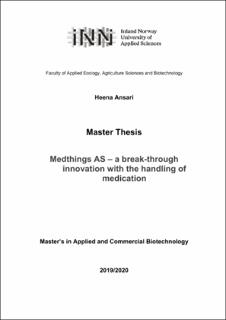Medthings AS – a break-through innovation with the handling of medication
Master thesis

Åpne
Permanent lenke
https://hdl.handle.net/11250/3005443Utgivelsesdato
2021Metadata
Vis full innførselSammendrag
Patients depend on medicines to maintain health, prevent illness, manage chronic ailments and treat/improve disease conditions. However, there are growing reports indicating the misuse of medicines (not taken on time, skipped dosage, irregular or improper dosage) causing a great deal of challenge to the health sector. The major challenge lies with the elderly people (above 75 years) who often tends to forget their medications or are not adhered to it. At present, changing demography with a high number of elderly people and providing them quality health services is the biggest challenge. People aged 80 years or over use an average of 5.8 prescription drugs per person. The global spending on medicine reached 1.2 trillion U.S. dollars in 2018 and is set to exceed 1.5 trillion dollars by 2023, while the global automatic pill dispenser machine market accounted for 1,755 million dollars in 2016 and is estimated to reach 3,023 million dollars by 2023. Studies suggests that 25% of the emergency rooms are alone filled with patients taking wrong medications making it the cause of majority of the deaths and involving an expenditure of $10.30 billion annually. Several losses of life can be avoided if intake of medicine can be controlled.
In addition, there is a huge medicine wastage due to unused/expired or skipped dosage. In 2019, Swedish pharmacies collected over 1,300 tonnes of medicinal residues (Wallêr, 2019), affecting the economy and well and the nature. Medicine management plays a very vital role in order to ensure the correct intake of medicine. Several approaches, from nurses to automated robots have been sought to ensure the correct use of medicines but none of them have been able to turn out completely effective. The variety of automated pill dispensers in the market with multiple functionality and features lack one thing or the other. Although every dispenser is produced with the aim of dispensing the correct medicine at the correct time with accurate dose, it fails to ensure whether the medicine is actually taken or just thrown away.
This thesis was written with a purpose to investigate the specific needs for medicine management using Mobili 1) and to suggest a market entry strategy for it in the Swedish market. Several articles and literature reviews were considered to gather background knowledge on this issue and some primary data were collected through personal communications with 10 concerned persons. Furthermore, business analysis tools were also used to study the market and the target customers and to know about the competitors.
Overall, an image that despite a hefty number of pill dispensers in the market, the exact number of them used at present and their comparison based on the price was not clear. An important finding was that although not quite great, but still there is possibility of entrance and success for Mobili with the target group of people above 75 years with chronic ailment and multi drugs prescriptions, or young age group with daily supplement intake having a busy schedule requiring reminder. Although there was a conflict of thoughts on the benefits and trustworthiness of the pill dispensers, yet the literature suggested that the elderlies are quite familiar with the technology and the health professionals also praise such automated pill dispensers.
1) An innovative and modern pill dispenser system produced by Medthings AS, Norway
Beskrivelse
Master’s in Applied and Commercial Biotechnology. Inland Norway University of Applied Sciences, Faculty of Applied Ecology, Agriculture Sciences and Biotechnology.